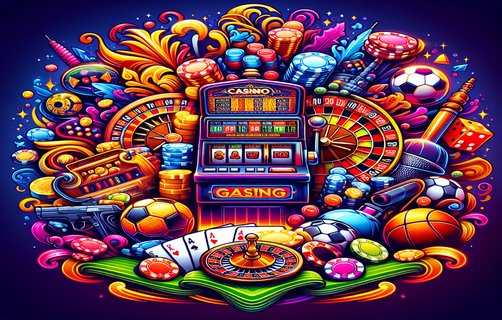Balancing Complexity: An In-Depth Analysis of Game Mechanics
खेल मेकैनिक्स का संतुलन: एक गहन विश्लेषण
In the world of game design, mechanics such as bonus cards, zone adjustments, time rules, difficulty progression balancing, card draws, and winning goals play a crucial role in creating engaging and challenging experiences for players. This analysis delves into these key components, examining their interrelation and overall impact on gameplay.
The first focus is on **bonus cards**, which serve as incentives that enhance strategic depth. Their implementation can vary; some games use them to reward skillful play while others may deploy them as catch-up mechanisms. The analysis considers the timing and frequency of bonus card deployment, noting that a well-timed bonus can invigorate gameplay, whereas excessive bonuses may disrupt balance.
Next, we explore **zone adjustments**, which refer to spatial changes within the game that can affect player positioning and strategy. These adjustments can significantly alter dynamics, introducing new layers of tactical complexity. The challenge lies in maintaining a balance that makes the zone adjustments feel impactful without rendering previous strategies obsolete.
Following this, **time rules** warrant discussion. The rules governing how time is managed within a game can either create tension or allow for contemplative strategies. Games must strike a balance where time constraints challenge players without forcing rush decisions that detract from enjoyment. This can be particularly pivotal in competitive scenarios where strategic planning is paramount.
When considering **difficulty progression balancing**, designers must thoughtfully calibrate challenges to maintain engagement without causing frustration. An effective progression system keeps players feeling accomplished while gradually increasing the challenge, ensuring that expert players are also catered for, turning the game into a rewarding experience at all levels.
**Card draws** can be a double-edged sword in gameplay. They introduce an element of chance that can lead to thrilling moments but can also frustrate players if luck becomes the primary determiner of victory. Designing a system that mitigates the impact of luck, perhaps through mechanics that allow players to influence their draws, enhances fairness and player agency.

Finally, we turn to the concept of **winning goals**—the criteria that determine victory. Clarity in winning conditions can enhance player motivation and focus gameplay. It is essential that these goals align with the game's theme and mechanics, providing players with a cohesive experience while ensuring that they are achievable yet challenging.
In conclusion, the intricate interplay of these game mechanics requires thoughtful design and balancing. Striking the right equilibrium fosters not only a fair challenge but also a captivating experience that keeps players returning. Game designers must remain innovative, breaking traditional molds and embracing new ideas to keep gameplay fresh and engaging.
खेल डिजाइन की दुनिया में, बोनस कार्ड, क्षेत्र समायोजन, समय नियम, कठिनाई प्रगति संतुलन, कार्ड ड्रॉ, और जीतने के लक्ष्य जैसे तंत्र खिलाड़ियों के लिए रोमांचक और चुनौतीपूर्ण अनुभव बनाने में महत्वपूर्ण भूमिका निभाते हैं। यह विश्लेषण इन प्रमुख घटकों में गहराई से उतरता है, उनके अंतर्संबंध और समग्र प्रभाव पर विचार करता है।
पहला ध्यान है **बोनस कार्डों** पर, जो प्रोत्साहन के रूप में कार्य करते हैं जो रणनीतिक गहराई को बढ़ाते हैं। उनका कार्यान्वयन भिन्न हो सकता है; कुछ खेल उन्हें कुशल खेल के लिए पुरस्कार देने के लिए इस्तेमाल करते हैं जबकि अन्य उन्हें पकड़ने के तंत्र के रूप में तैनात कर सकते हैं। विश्लेषण बोनस कार्ड की तैनाती के समय और आवृत्ति पर विचार करता है, यह नोट करते हुए कि एक अच्छी तरह से समयबद्ध बोनस खेल को जीवंत बना सकता है, जबकि अत्यधिक बोनस संतुलन को बाधित कर सकते हैं।
इसके बाद, **क्षेत्र समायोजन** पर चर्चा की जाएगी, जो खेल में स्थानिक परिवर्तनों को संदर्भित करते हैं जो खिलाड़ी के स्थान और रणनीति को प्रभावित कर सकते हैं। ये समायोजन महत्वपूर्ण रूप से गतिशीलता को बदल सकते हैं, नई रणनीतिक जटिलता के स्तर पेश कर सकते हैं। चुनौती यह है कि ऐसा संतुलन स्थापित किया जाए जो क्षेत्र समायोजनों को प्रभावी महसूस कराए बिना पिछले रणनीतियों को अप्रचलित बना दे।
इसके साथ ही, **समय नियमों** पर चर्चा करना आवश्यक है। खेल में समय प्रबंधन के नियम तनाव उत्पन्न कर सकते हैं या ध्यान केंद्रित रणनीतियों की अनुमति दे सकते हैं। खेलों को इस संतुलन को बनाए रखना चाहिए जहां समय की सीमाएं खिलाड़ियों को चुनौती देती हैं बिना उन्हें ऐसे निर्णय लेने के लिए मजबूर किए जो आनंद को कम करें। यह प्रतिस्पर्धी परिदृश्यों में विशेष रूप से महत्वपूर्ण हो सकता है जहां रणनीतिक योजना सर्वोपरि होती है।
जब **कठिनाई प्रगति संतुलन** पर विचार किया जाता है, तो डिज़ाइनरों को ध्यान से चुनौतियों को संरेखित करना होगा ताकि वे संलग्नता बनाए रख सकें बिना निराशा का कारण बने। एक प्रभावशाली प्रगति प्रणाली खिलाड़ियों को उपलब्धियों की अनुभूति देती है जबकि धीरे-धीरे चुनौती बढ़ाती है, यह सुनिश्चित करती है कि विशेषज्ञ खिलाड़ियों का भी ध्यान रखा जाता है, खेल को सभी स्तरों पर संतोषप्रद अनुभव में बदल देता है।
**कार्ड ड्रॉ** खेल में एक दोधारी तलवार हो सकती हैं। वे ऐसा मौका पेश करते हैं जो रोमांचक क्षणों की ओर ले जा सकता है लेकिन यदि भाग्य जीत का मुख्य निर्धारक बन जाता है तो यह खिलाड़ियों को निराश कर भी सकता है। एक ऐसा तंत्र डिजाइन करना जो भाग्य के प्रभाव को कम करता है, संभवतः ऐसे यांत्रिकों के माध्यम से जो खिलाड़ियों को उनके ड्रॉ को प्रभावित करने की अनुमति देता है, निष्पक्षता और खिलाड़ी की एजेंसी को बढ़ाता है।

अंत में, हम **जीतने के लक्ष्यों** की अवधारणा पर ध्यान केंद्रित करते हैं—जो जीत का निर्धारण करते हैं। जीतने की स्थितियों में स्पष्टता खिलाड़ियों की प्रेरणा और खेल पर ध्यान हतोत्साहित करती है। आवश्यक है कि ये लक्ष्य खेल के विषय और तंत्र के साथ संरेखित हों, खिलाड़ियों को समग्र अनुभव प्रदान करते हुए यह सुनिश्चित करते हुए कि वे प्राप्त करने योग्य लेकिन चुनौतीपूर्ण हों।
अंत में, इन खेल तंत्रों के जटिल परस्पर क्रिया को विचारशील डिजाइन और संतुलन की आवश्यकता होती है। सही संतुलन रखना न केवल एक निष्पक्ष चुनौती को बढ़ावा देता है बल्कि एक आकर्षक अनुभव भी बनाता है जो खिलाड़ियों को पुनः लौटने के लिए प्रेरित करता है। खेल के डिजाइनरों को नवोन्मेषी बने रहना चाहिए, पारंपरिक मोल्डों को तोड़कर और नए विचारों को अपनाकर खेल को ताजा और आकर्षक बनाए रखने के लिए।

comments
GamerGeek
This analysis brilliantly highlights the importance of balancing game mechanics! I never thought about how bonus cards can disrupt gameplay if not timed properly.
StrategyMaster
The discussion on difficulty progression is spot on! Games should constantly challenge us without turning us away.
CardShark
I love how you emphasized card draws and their impact on player experience! A great read!
ZoneWarrior
Zone adjustments can truly change the game dynamics, and I appreciate the insight into their balanced implementation.
TimeKeeper
Time rules can really make or break a game. Glad to see it covered thoroughly in this article!
WinningGoalie
Winning goals being clear and aligned with mechanics is such a relevant point. It makes the game so much more engaging!